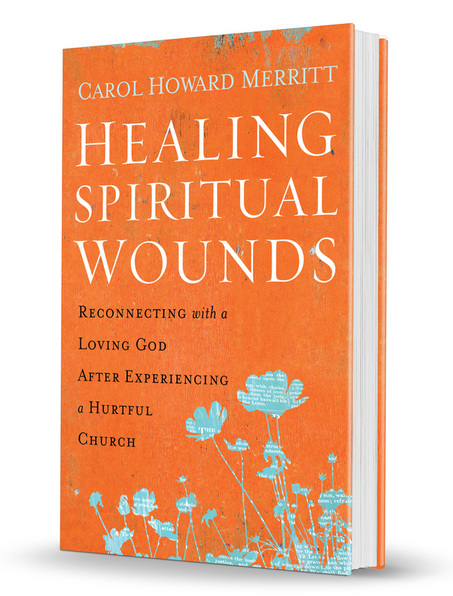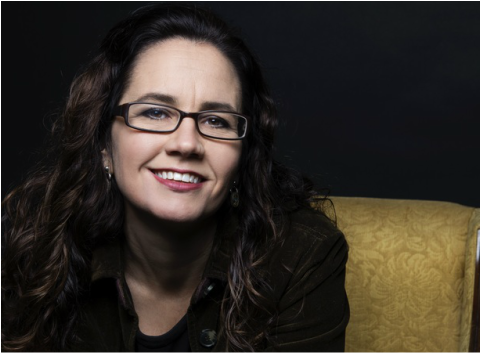A man pours out his life pursuing a calling that would clearly put on display the grace and life of Jesus. He is thwarted at every turn. His prayers for help go unanswered. God is silent.
A woman is abused by her husband. The church exhorts her to bear up under her cross as she submits to her husband’s authority.
Sermons about sin and guilt lodge deep in the heart of a young high schooler. They become the youngster’s identity, tooprofoundly sunk for any message of salvation to uproot.
Spiritual wounds take many forms and come from many sources. Agents of God act in ways that betray the God whose name they bear. And God remains silent all the while.
These wounds require their own special care. And Carol Howard Merritt shows us the way in her moving and wise new book, Healing Spiritual Wounds: Reconnecting with a Loving God After Experiencing a Hurtful Church.
Spiritual Guidance for Spiritual People
Merritt understands spiritual wounds. She bears more than her fair share of scars. These are put on display as we learn of the wounds they represent and the healing that closed those wounds.
The beauty of the book is that it does not reek of the cynicism that a life so marked more often exudes. This healer is not only wounded but also healed.
In offering guidance for the spiritually afflicted, Merritt works with the critical insights that spiritual wounds are distinct from psychological wounds, and that many of us cannot get away from living in relation to God no matter how hard we might try.
She understands the gay man who knows he has to find his peace, eventually, by making peace with God—after a lifetime of hating Christianity for the destructive sermons he was subjected to as a boy. She knows what it is for someone to catch himself praying to the God he is trying to walk away from.
Some of us are just religious people. It’s in our bones. And we know that there’s a God of love who must be part of our finding wholeness again—even if it was the absence or silence of this God that inflicted the wound in the first place.
Trifecta of Love
The aisle along which Merritt ushers her readers is not less profound for its simplicity. It is an invitation to a trifecta of love: love of God, love of neighbor, and love of self.
I confess, whenever I hear someone say that Jesus’s call to “love your neighbor as yourself” is a mandate to self-love I feel my face take on its uncontrollable, “More exegetically sound than thou,” New Testament scholar, cynical smirk. Truth be told, I don’t think Jesus commands self love. Like the writer of Ephesians, Jesus assumes it (see Eph 5:28-29). It’s the standard against which we are to compare our love for our neighbors to figure out if we’re getting love right.
But there is deep wisdom in this newfound imperative. And not least of all for those suffering from spiritual wounds. That’s because spiritual wounds have a power to strike at core elements of who we are. They can tell us that we, ourselves, are worthless. They can whisper in our ears that God above could never love us. They can poison any sprout of hope that the body one inhabits is good or beautiful or holy.
 Indeed, it is precisely as people who have not learned to love ourselves that we are most apt to be agents of another’s wounding; or, to put it more positively, that we are most apt to fail in the high calling to love our neighbors.
Indeed, it is precisely as people who have not learned to love ourselves that we are most apt to be agents of another’s wounding; or, to put it more positively, that we are most apt to fail in the high calling to love our neighbors.
And so Merritt walks through the barriers to self-love that we face in transactional narratives of love, in loveliness being tied to financial success, in religiously-imposed shame for the bodies we inhabit, in persistent failure to achieve high marks on the scoreboard of evangelical piety and purity culture. She helps us dissociate the narratives that propagate self-loathing from the message of a loving God to us.
Healing Spiritual Wounds leads us in the way of unflinching hope to a better God than the god who stands behind our afflictions. And it does so without lapsing into impossible idealism or sentimentality.
Work to Do
This invitation to find healing through reconnecting with God is largely issued through stories: Carol Howard Merritt’s stories of her own journey and snippets of insight into the journeys of those with whom she has walked. But with each chapter it returns to the reader with pastoral counsel for beginning the hard work of finding the shalom she believes God wants for each of us.
As with physical and psychological wounds, spiritual wounds require careful attention if they are to mend properly. And so each chapter ends with suggestions for creating physical and temporal space to address the pains that linger. They beckon us to name the hurts and to have compassion on ourselves for our complicity or missteps or simply for believing what we were told.
We are invited to imagine a beautiful world such as we would experience if, in fact, God’s kingdom would come and God’s will would be done on earth. And we are called to entrust ourselves to the kind of good God who would bring such a world into existence. In short, we are called to hope, to entrust ourselves to the God of this hope, and in this to rediscover love. Faith, hope, and love: these three.
For anyone who has known the wounding that can come from those speaking and acting in God’s name, this book is a must. In other words, if you have ever been to church or know someone who has, this book is for you.
Take. Read. And find healing for your wounds.
Disclosure: I received a free copy of this book from Harper One














